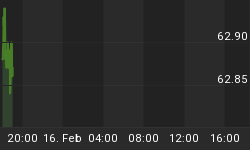"...The price of gold, US consumers and the International Monetary Fund all agree the US economy is about to slow down dramatically..."
SO FURTHER HIKES in US interest rates could still "prove necessary" according to Ben Bernanke and his team.
Stocks and bonds sold off hard Wednesday on the release of minutes from last month's Fed policy meeting. "They still have their finger on the trigger for raising interest rates," reckons one US fund manager running $23 billion in Los Angeles speaking to Bloomberg in between watching his portfolio wobble.
But gold, on the other hand, just doesn't buy it. Spot gold prices continued to trade in a tight range around $676.50 per ounce. Gold also held steady against the other major currencies, remaining near 6-week highs versus Sterling, the Euro and Japanese Yen.
Why so dismissive? Well, the Fed minutes don't give too much away. But then, what's to know? The FOMC noted that liquidity in the bond and loans market had remained "readily available" up until March, even as borrowing by non-financial corporations moderated down alongside slower M&A activity in the stock market thanks to last months sell-off in global equities.
"Indicators pointed to a continuing deceleration in house prices this quarter," the Fed officials also admitted amongst themselves, "and home mortgage borrowing probably continued to slow. M2 [money supply] increased more moderately in February than at the end of 2006 as the expansion of liquid deposits slowed from its outsized fourth-quarter rate."
None of this would give cause to the Bernanke Fed to raise rates, however - and news from a Bloomberg-Los Angeles Times poll backs up the gold market's view of today's Fed minutes. Six out of 10 respondents now predict a US recession ahead. Six years ago a similar proportion of consumers surveyed - some 64% - proved prescient in forecasting a US recession in 2001.
"We're living on borrowed time," reckons one Colorado respondent to the new survey. "We spend ridiculous amounts of money on the war and now we have issues with the subprime housing market."
The International Monetary Fund also reckons the US economy is set to slowdown. Its semi-annual report, published today in Washington, cut the forecast for 2007 growth in the US - which accounts for a fifth of the global economy - from 2.9% to 2.2%.
Yet overall, says the IMF, the world economy will survive the US slowdown and expand by 4.9% for the fourth year running.
"The US housing market's broader impact on the economy has been contained," reckons Simon Johnson, the IMF's chief economist. That verdict may come to look premature; this week sees a lawsuit filed by 20,000 private individuals caught holding $600 million worth of bonds in American Business Inc. when it went bust in 2005.
American Business offered yields of nearly 13% on 13-month notes according to the new SEC filing. No one spotted how unlucky that offer would turn out, least of Wall Street's finest. Bear Stearns, Credit Suisse, J.P.Morgan and Morgan Stanley picked up $50 million in fees between 2000 and 2003 by lending to American Business, says the suit - even though the firm was technically insolvent.
How much trouble this lawsuit and others like it will actually cause Wall Street's finest remains to be seen, of course. But with 54 subprime lenders now collapsed since late 2006 alone as ML-implode.com reports, what hope does the Fed really have of raising rates - no matter what happens to inflation in the cost of living?
Real interest rates paid on US Dollars, in short, look set to retreat further from the half-decade high hit six months ago. Falling returns on cash will only push fresh investment into gold - the asset that costs you to own it just as long as cash is worth holding.
















